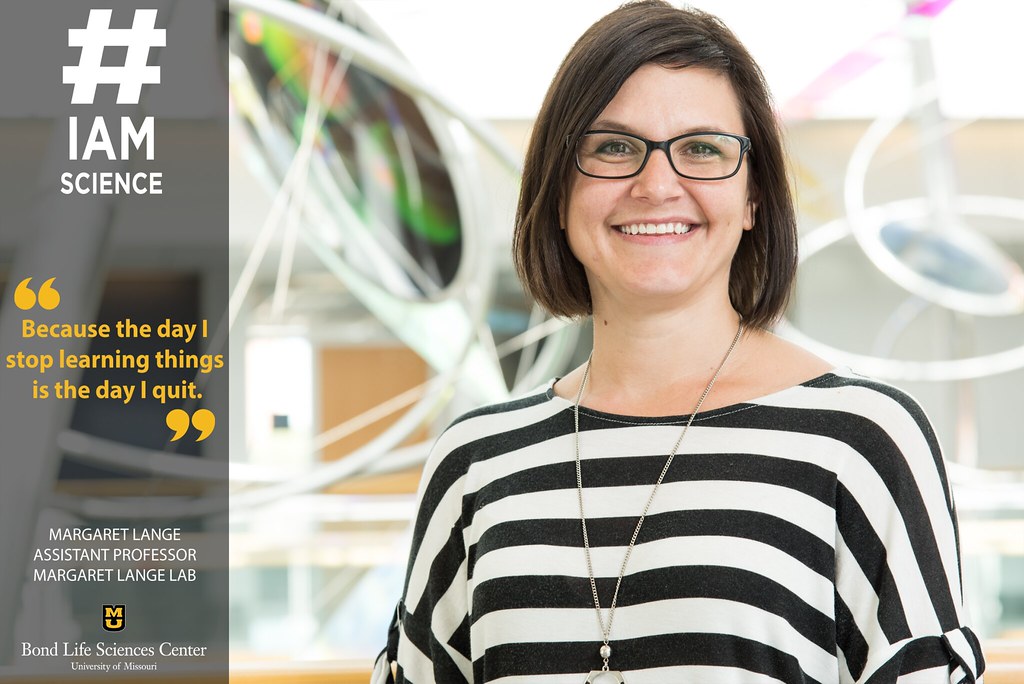Published on
Building a community through screens and limited interaction can be difficult. However, it’s no problem for Margaret Lange at Bond Life Sciences Center.
“I’ve met such wonderful people,” Lange said. “It really is true that if you surround yourself with the right kind of people who are positive, who think creatively and who ask good questions, it shows you how to model that behavior yourself. It teaches you to be better and helps you think better.”
Lange was originally part of the Donald Burke lab until she became an assistant professor of Molecular Microbiology and Immunology in the School of Medicine and established her own lab in Sept 2019, getting her start in Bond LSC lab space. Even though March 2020 brought shutdowns and restrictions, Lange still found herself in a mentoring role.
“I’ve had some mentoring experience but never as the primary investigator (P.I.) of the lab, so it’s a new experience for me,” Lange said. “I’m learning from that and learning from them and, hopefully, they’re learning some things from me as well.”
Lange understands that establishing a lab requires equipment and published papers, but also a good team.
“The reason I joined her [lab] is that women in science in a leadership role is very important and that needs to be encouraged,” said Rachna Aneja Arora, research scientist in the Lange lab. “I see her as a good leader and a good mentor. She has a very inspirational role and can be a role model for the young girls and women in science to take on the challenging role to be a P.I.”
However, Lange’s path towards science began before she even arrived at Mizzou.
Growing up in rural Missouri, Lange attended a small high school that didn’t offer many science classes beyond the traditional chemistry and anatomy classes.
“I didn’t even know at that time that you could do research in a lab,” Lange said. “I had no idea what opportunities were available.”
She did have some knowledge of microbiology since her mother was a medical technologist at the local hospital where she spent time identifying microbes that were causing infections in patients. So, Lange decided to enroll in a microbiology class once she started college. Not too long after, the professor asked Lange to help her with her research.
“If it wasn’t for her, I never would have probably tried doing research at all,” Lange said. “It’s really fun to design experiments and to answer questions. And so that was really kind of where my love for that started to show, or at least become evident to me, anyway.”
Since then, Lange has been interested in how cells can sense viruses and how that shapes immune signaling.
Humans have many receptors that can recognize different parts of viruses and can cause different immune responses based on what they’re recognizing.
“We really try to understand what is working at the level of the virus to shape those responses and how that influences how our immune system is able to fight those viruses,” Lange said.
The Lange lab is currently looking to improve the host-virus interaction regarding vaccines.
Vaccines generate a response that is specific to a certain component of a virus. However, just focusing on a single protein or nucleic acid is not enough to generate a robust and specific immune response. So, researchers like Lange are working towards improving adjuvants — immunostimulants in vaccines — to create a stronger response that helps shape antibody and T cell responses.
“Investigating what types of nucleic acid motifs can actually bind and signal through these pattern recognition receptors helps us design better adjuvants that can better shape the immune response for a specific pathogen,” Lange said. “For example, if you use a nucleic acid from the SARS coronavirus, it might shape the immune response in a specific way targeted to that specific virus, and then you hopefully get a better efficacy for your vaccine.”
For now, Lange and her team are working towards developing their lab and getting manuscripts underway.
“I really admire her for all she’s doing,” Aneja Arora said. “I think we will work harder to get things moving forward. So, I just wish her all the best and wish her good luck setting up a very established lab.”
